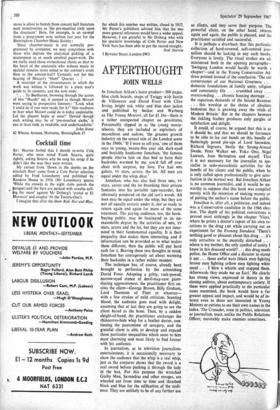AFTERTHOUGHT
JOHN WELLS
In Jonathan Aitken's latest product-300 pages, blue cloth boards, snaps of Twiggy with Justin de Villeneuve and David Frost with Clive Irving, bright red, white and blue dust jacket and published by Seeker and Warburg as The Young Meteors, all for £1 16s—there is a rather unexpected chapter on prostitutes. Presumably slipped in as the young meaty- whores, they are included as exploiters of masochism and sadism, 'the greatest growth industry on the sexual side of the London scene in the 1960s."If I were to tell you,' one of them says to young, twenty-five year old, dark-eyed and boyishly handsome Jonathan, 'the famous people who've lain on that bed to have their backsides warmed by me, you'd fall off your chair with surprise, my love. I've had MPs galore, TV stars, actors, the lot. All men are equal under the whip, dear.'
Jonathan, who has also had three sirs, TV stars, actors and the lot breathing their private fantasies into his portable tape-recorder, has obviously pondered on the old tart's words. All men may be equal under the whip, but they are not all equally ecstatic under it, nor as ready to return again and again for more of the same treatment. The paying audience, too, the book- buying public. may be fascinated to an un- reasonable degree by the activities of MPS, TV stars, actors and the lot, but they are not inter- ested in their fundamental equality. It is their inequality that makes them interesting, and if information can be provided as to what makes them different, then the public will pay hard cash for it. Bearing these two thoughts in mind, Jonathan has courageously set about warming their backsides in a rather milder manner.
The technique has, of course, already been brought to perfection by the astonishing David Frost. Adopting a gritty, rock-pawed, narrow-eyed stance of devil-may-care giant- slaying aggressiveness, the practitioner first ex- cites the client—George Brown, Billy Graham, Lord Thomson of Fleet or whoever— with a few strokes of mild criticism. Scenting blood, the audience goes mad with delight, assuming that at last they are going to see the client bared to the bone. Then, by a sudden sleight-of-hand, the practitioner exchanges the rhinoceros-hide whip for a feather duster, con- tinuing the pantomime of savagery, and the grateful client is able to develop and expand those particular inequalities which seem to him most charming and most likely to find favour with his audience.
In journalism, as in television journalism- entertainment, it is occasionally necessary to show the audience that the whip is a real whip, just as the conjuror shows that the sword is a real sword before pushing it through the lady in the box. For this purpose the wretched Guilty Men, Savundras and other stooges, are wheeled out from time to time and thrashed black and blue for the edification of the audi- ence. They are unlikely to be of any further use as clients, and they serve their purpose. The powerful client, on the other hand, returns again and again, the public is pleased, and the practitioner satisfied and successful.
It is perhaps a drawback that this particular collection of hard-covered, soft-centred jour- nalism should be lacking in any such booby. Everyone is lovely. The ritual strokes are ad- ministered both in the opening paragraphs— 'Swinging London would hardly be worth a chapter'—and in the Young Conservative Ad- dress printed instead of the conclusion. 'The old cornerstones of our National Greatness . . . domestic foundations of family unity, religion and community life . . . crumbled away . . . overcrowding .. . chronic housing shortage .. the rapacious demands of the Inland Revenue . . . this worship at the shrine of absolute hedonism that is gnawing away the vitals of Modern Britain.' But in the chapters between the tickling feather produces only gurgles of satisfaction and delight.
It could, of course, be argued that this is as it should be, and that we should be fortunate to be able to lay our hands on this bundle of flatteringly posed pin-ups of Lord Snowdon. Richard Ingrams, Sheila the Strong-Armed Swede, Peter Walker MP, Yoko Ono, Nigel Lawson, Jean Shrimpton and myself. That it is not necessary for the journalist to spe- cialise in sado-masochistic activities for the benefit of his clients and the public, when he is only called upon professionally to give satis- faction in the normal way. But Jonathan Aitken is no common journalist, and it would be un- worthy to suppose that this book was compiled merely with the intention of making money or of putting the author's name before the public.
Jonathan is, after all, a politician, and indeed was a Conservative candidate in the 1966 elec- tion. The depth of his political convictions is proved most strikingly in the chapter 'Vices,' where he prints a doctor's report of his own re- actions to the drug LSD while carrying out an experiment for the Evening Standard. 'There's nothing good or pleasant about this drug ... it's only attractive to the mentally disturbed . . . where is my mother, the only symbol of sanity I know in this diseased world? ... this drug needs police, the Home Office and a dictator to stamp it out ... those awful wars (black men fighting brown men fighting yellow men fighting white men) . . . I blew a whistle and stopped them. Afterwards they made me an Earl.' He clearly has strong views, expressed in theory in the closing address, about contemporary society. If these were applied practically to the particular cases examined, the book would have a far greater appeal and impact, and would be of in- terest even to those not interested in Young Meteors or curious to see their own names in the index. The Crusader, even in politics, television or journalism, must, unlike the Public Relations Officer, inevitably make enemies sometimes.






































 Previous page
Previous page